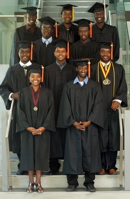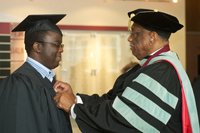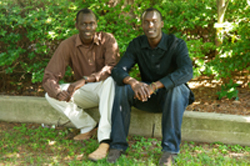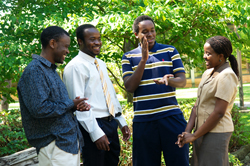Hope After War: Rwandan Students Graduate
They arrived at UALR four years ago following a grueling, 25-hour flight halfway around the world from their homes in Rwanda, a small country tucked between the Democratic Republic of Congo, Tanzania, and Uganda.
A Desire to Rebuild and to Lead
Some of them spoke very little English; all carried the hopes and aspirations of a nation on their shoulders. A country shattered by war and horrifying genocide now trying to heal itself.
Those 10 students – the first UALR Rwandan Presidential Scholars – will graduate on May 19 at the Jack Stephens Center with degrees in engineering, economics, management information systems, computer science, biology, and construction management. Some will go on to graduate school; others will head home immediately to begin to rebuild the intellectual capital of their country.
“Rwanda needs our force as young people,” Valens Nteziyaremye said shortly after he arrived at UALR in 2009. “There were men who studied and knew many things, and most of them died in the genocide. We have to help our country and our families.”
Four years later, Nteziyaremye will receive a degree in systems engineering.
Before he returns to Rwanda to help his country, he will go to graduate school at the University of Florida to earn a Ph.D. in mechanical and aerospace engineering.
“It’s gone so fast,” he said, reflecting on his time at UALR.
He and his classmates were infants during the 1994 war between the Hutus and the Tutsis – tribes that coexisted and intermarried in the past. The war culminated in a 100-day genocidal massacre where at least a million innocent people were killed.
“Pretty much every friend I have was deeply affected by the war and the genocide,” said Mark Karugarama, who came to UALR with his twin brother Matthew. They came through another Arkansas-Rwanda program, Bridge2Rwanda, and also are graduating Saturday. “I have other friends I have to comfort because they have lost pretty much everything they had. It has affected my life in many different ways.”
The war and killings stripped the country of leaders and left in its wake orphans, widows, disease, and poverty; no one in the country was unaffected.
A Bridge to Rwanda
“There is a measure of grace in these kids who overcame so much and faced terrible things,” said Lajuanna Magee, director of International Friendship Outreach of Central Arkansas. “To us, it is history. To them, they lived it.”
Her organization works with the consortium of public and private Arkansas institutions, providing host families for the students selected by the Rwanda Presidential Scholars Initiative. The program allows some of the best Rwandan students to come to Arkansas universities on four-year scholarships, financed by the Rwandan government.
The consortium was inspired by Bridge2Rwanda, a nonprofit effort co-founded by former Stephens Inc. investment banker Dale Dawson to help the country rebuild its intellectual capital.
In 2008, UALR administrators – led by Dr. Charles Donaldson, vice chancellor of educational services and student services – as well as representatives of Hendrix College, went to Rwanda to interview the students. Twenty-five came to Arkansas and following a summer of intensive English language training at UALR, the largest number, 10, enrolled here.
 “These bright young people have struggled to learn while enduring hardships most of us cannot imagine,” Donaldson said.
“These bright young people have struggled to learn while enduring hardships most of us cannot imagine,” Donaldson said.
Of the first group of Rwandan students spread out among six schools, 12 of the students achieved all A’s with a cumulative grade point average of 3.7.
“The two first years were a challenge. I was a little homesick,” said Patrick Kamongi. “The last two years, ‘No more’.”
The soon-to-be computer science graduate is weighing offers from two graduate schools, the University of North Carolina and the University of North Texas. He will pursue a Ph.D. in computer science.
Jimmy Shyaka, who is heading to graduate school before returning to Rwanda, credited Donaldson, who is almost a foster father for the students, for the group’s success. They learned early that the door to Donaldson’s office and home was always open – especially on Sundays, when the vice chancellor loves to cook for a crowd. Shyaka said Donaldson learned to cook several Rwandan corn dishes to help ease their homesickness.
They delved into student life, participating in student government, joining international clubs and activities, engaging in service projects, and working with scientists on research projects.
Toussaint Salvator Kaneza said at UALR, he learned about time management, how to budget his time, and how to work in teams. Homesickness was tough in the first two years of his college career, “but here at UALR, the community has been very receiving of internationals.”
He and his classmates also took advantage of travel opportunities. Kaneza visited New York City twice, including a visit to the World Trade Center memorial, the Great Smoky Mountains, and Washington, D.C.
 “There is no better opportunity than this and it gives you great exposure to the outside world. It just broadens your mind and your perspective,” said Mark Karugarama.
“There is no better opportunity than this and it gives you great exposure to the outside world. It just broadens your mind and your perspective,” said Mark Karugarama.
He and his twin brother Matthew traveled, worked at the Office of Student Life, and won elections to the Student Senate which broadened their UALR experiences
“When I got here, I was a hopeless teenager,” said Janviere Umuhoza, a petite woman, with a large smile, the only female in the group.
“Now I am a hopeful young lady, vigorously ready to succeed and bring hope to people who are in hopeless situation,” said the confident systems engineering student. She lost both parents in the genocide.
Forgiveness is Freedom
Smiling, outgoing, and determined, Umuhoza and her UALR Rwandan classmates are examples of the nationwide effort in Rwanda to foster reconciliation and healing. The movement started at the grassroots level; promoted by the government, it seeks to help the country move forward and rebuild.
“To be honest with you, my family knows who they are and who I am, but I don’t know if I am a Tutsi or a Hutu because I don’t want to know. I am not interested to know,” said Jean Luc Umwungeri. “I don’t know if my friend is a Hutu or a Tutsi, I don’t care. It is erased from our minds.”
He and his friends are part of the younger generation of Rwandans working to erase the tribal differences that led to the divisiveness. They are part of the country’s concerted effort of reconciliation.
The twins, Mark and Matthew, are the sons of Tharcisse Karugarama, Rwanda’s minister of justice and the attorney general in the Rwandan government. The father has played an important role in the prosecution of crimes associated with the genocide and the movement for reconciliation.
Karugarama’s sons and their classmates are ambassadors of sorts for a philosophy that forgiveness is freedom. It is a mantra they offer to American classmates whose society still suffers from social, racial, and political divisions.
“How to forgive and move on? That is very difficult. It is a process that doesn’t happen overnight,” Matthew said. “Forgiveness begins at the deep, deep psycho-spiritual level. Sometimes we don’t even try to get away from the pain because sometimes the best way to get over pain is to endure it and overcome it without running away from it.”
The twins were born as refugees in Uganda during the years of war that preceded the 1994 genocide. The family now includes an adopted brother the father found living in the streets, a five-year-old who had lost both arms. The boy’s natural father chopped off the limbs.
“His father cut his hands because his father was participating in genocide, and this boy told on him to the authorities, so his dad cut off his hands and then burned them,” Mark said. “In Rwanda during the genocide, if I am Hutu and you are Tutsi and you are my wife, the people who are perpetrating the genocide said, ‘well, you have to kill her. She’s not us. Kill your wife. Kill your children’. I mean, the nastiest things that you can imagine.”
He added, “Human beings are capable of crazy things. It is very hard to imagine, but it happened in the Holocaust, it happened in Bosnia, in the Sudan. And it happened in Rwanda.”
The twins said the movement for reconciliation came from the people themselves.
“The people decided, if we are not of the same mind, we’re not going to work together,” Mark said. “This is our only option. We have to forgive each other and reconcile and make things happen, and try to walk together, or we’re going back to a downward spiral, going back to a bad history.”
As a result, the government has organized national unity and reconciliation programs in which perpetrators return to their villages after serving sentences and seek forgiveness from the families of their victims.
“It takes a human being to go more than above themselves to be able to forgive you and live with you because they know without that – forgiveness – we’re not going to move forward,” Mark said. “If I’m going to hate you, you are going to hate me, and everybody is going to hate each other; we are never going to move forward. So the only way is for the people to work together and get over their hate. It is very hard for the mind to understand. It is hard, but it is possible.”
The twins tried their hands at student government and tried to understand the American political scene.
“They can’t agree on anything, not even with the smallest things, not just because of the issues, but because you are Republican and I am Democrat,” Mark said.
“But it is important at a time like this when relations have reached a very volatile point, it is important for government and individuals to stay as far away as they can from hatred, from sowing hatred, or from fostering hatred,” Matthew Karugarama said.
Mark and Matthew’s parents will be at the UALR commencement ceremonies to see their sons graduate. The father will be speaking at the Clinton School of Public Service on Monday following Saturday’s commencement.
For the first time in their lives, the twins will separate for graduate school. Mark is heading to graduate school in Switzerland and Matthew to Amsterdam.
The 2012 UALR Rwandan Presidential Scholars are Jimmy Shyaka, Silas Habimana, Jean Felix Ganishuri, Jean Luc Umwugeri, Toussaint Salvator Kaneza, Janviere Umuhoza, Patrick Kamongi, Jean de Dieu Mutangana, Innocent Twesigye, and Valens Nteziyar.
